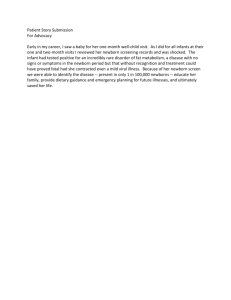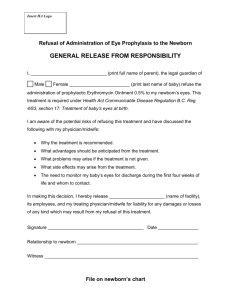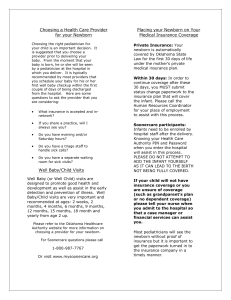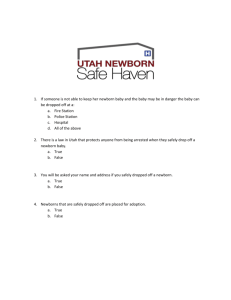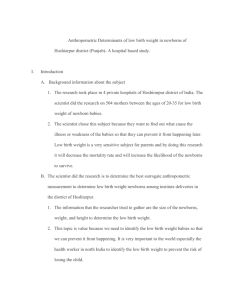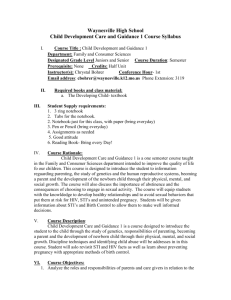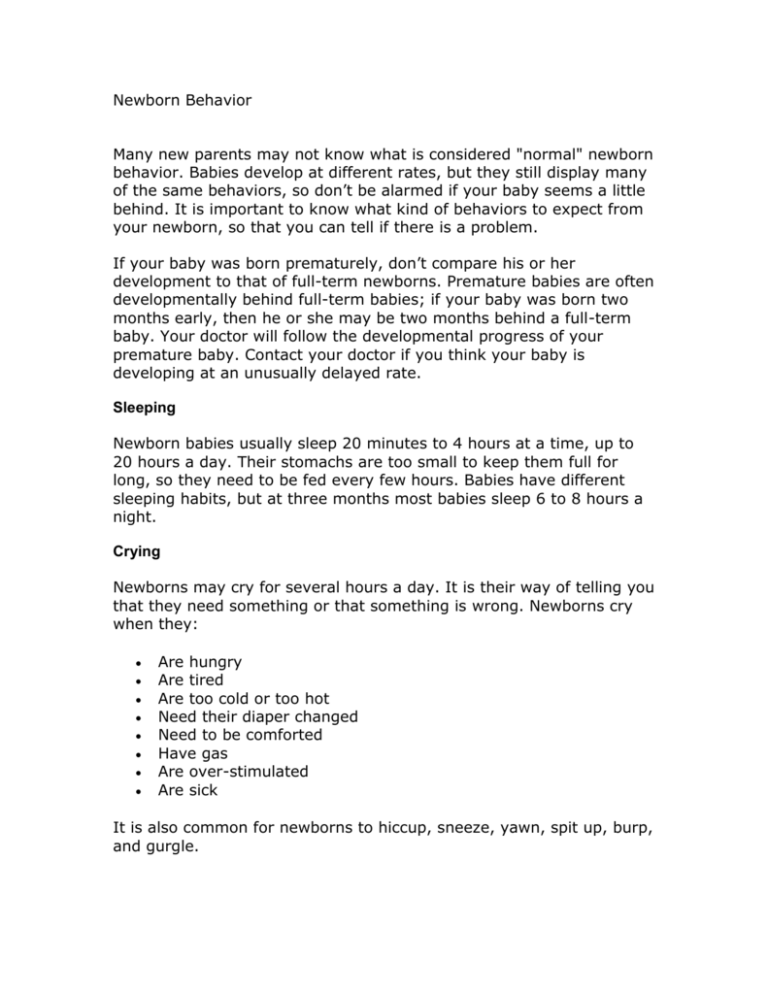
Newborn Behavior
Many new parents may not know what is considered "normal" newborn
behavior. Babies develop at different rates, but they still display many
of the same behaviors, so don’t be alarmed if your baby seems a little
behind. It is important to know what kind of behaviors to expect from
your newborn, so that you can tell if there is a problem.
If your baby was born prematurely, don’t compare his or her
development to that of full-term newborns. Premature babies are often
developmentally behind full-term babies; if your baby was born two
months early, then he or she may be two months behind a full-term
baby. Your doctor will follow the developmental progress of your
premature baby. Contact your doctor if you think your baby is
developing at an unusually delayed rate.
Sleeping
Newborn babies usually sleep 20 minutes to 4 hours at a time, up to
20 hours a day. Their stomachs are too small to keep them full for
long, so they need to be fed every few hours. Babies have different
sleeping habits, but at three months most babies sleep 6 to 8 hours a
night.
Crying
Newborns may cry for several hours a day. It is their way of telling you
that they need something or that something is wrong. Newborns cry
when they:
Are hungry
Are tired
Are too cold or too hot
Need their diaper changed
Need to be comforted
Have gas
Are over-stimulated
Are sick
It is also common for newborns to hiccup, sneeze, yawn, spit up, burp,
and gurgle.
Sometimes newborns cry for no reason at all. If this happens, try
comforting your baby by rocking, singing, talking softly, or wrapping
him or her in a blanket. Soon you will be able to tell what your baby
needs by how he or she cries.
You may not always be able to comfort your newborn. This is not your
fault. Try to be patient and remain calm when your newborn does not
stop crying. If necessary, have someone else stay with your baby
while you take a break.
Contact your doctor if your newborn cries more than usual, cries at a
different time of day than usual, or if the crying sounds different than
usual. These may be signs that your newborn is sick.
Reflexes
During their first few weeks, newborns maintain the position they had
in the womb (fetal position): clenched fists; bent elbows, hips, and
knees; arms and legs close to the front of the body. This will change
when your baby develops more control over his or her movements.
Newborns have several natural reflexes. Understanding these reflexes
will help you understand the cause of some of your newborn’s
behaviors.
Newborn reflexes include the following:
The rooting reflex: The newborn turns in the direction of food
and is ready to suck. Stroking a newborn’s cheek will cause this
response.
The sucking reflex: If you place an object in a baby’s mouth,
the baby naturally begins to suck.
The startle response: The baby throws out his or her arms and
legs and then curls them in when startled. This response often
includes crying.
The tonic neck reflex: The baby turns his or her head to one
side and holds out the arm on the same side.
The grasp reflex: The baby’s fingers close tightly around an
object placed in his or her palm.
The stepping reflex: The baby’s feet imitate a stepping action
when he or she is held upright with the feet touching a hard
surface.
A baby’s arms, legs, and chin may tremble, especially when crying.
This occurs because newborns’ nervous systems are not fully
developed.
Breathing
It is not uncommon for newborns to experience irregular breathing.
This is when newborns stop breathing for 5 to 10 seconds and then
immediately begin breathing again on their own. This is normal.
However, you should call your doctor or take your baby to the
emergency room if he or she stops breathing for longer than 10
seconds or begins to turn blue.
Vision
Newborns can see, but their eyes may be crossed because it is hard
for them to focus at first. Newborns can see movement and the
contrast between black and white objects. For the first couple of
months, it is easier for them to look at things at an angle. By two to
three months, babies have more control of their eye muscles and are
able to focus their eyes on one thing. They can also follow objects with
their eyes.
Hearing
Newborns can distinguish between different sounds. They recognize
familiar voices, so you should talk to your baby often. You may soon
find that your baby turns toward the sound of your voice. To
newborns, language sounds like music with different tones and
rhythms.
© Copyright 1995-2009 The Cleveland Clinic Foundation. All rights
reserved.
Source:
The Cleveland Clinic © 1995-2009. All Rights Reserved.
9500 Euclid Avenue, Cleveland, Ohio 44195 | 216.444.2200 | 800.223.2273 | TTY 216.444.0261
Date: 4/16/09

